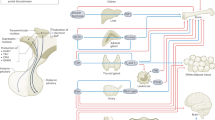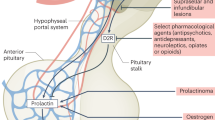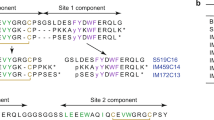Abstract
HUMAN parathormone1,2, ACTH3,4, insulin and glucagon5 are comparatively easy to determine immunologically because antisera with high activity against the corresponding mammalian hormone preparations also give a definite immune reaction with the human hormones. On the other hand, human growth hormone can only be demonstrated and determined immunologically using aiitiserum against primate growth hormone6–8. Lactogenic hormone (prolactin) has a marked species specificity similar to that of human growth hormone9–11. This communication presents further observations on the species specificity of prolactin.
This is a preview of subscription content, access via your institution
Access options
Subscribe to this journal
Receive 51 print issues and online access
$199.00 per year
only $3.90 per issue
Buy this article
- Purchase on Springer Link
- Instant access to full article PDF
Prices may be subject to local taxes which are calculated during checkout
Similar content being viewed by others
References
Berson, S. A., Yalow, R. S., Aurbach, G. D., and Potts, jun., J. T., Proc. Nat. Acad. Sci., 49, 613 (1963).
Tashjian, jun., A. H., Levine, L., and Munson, P. L., Endocrinology, 74, 244 (1964).
Felber, J. P., Experientia, 19, 227 (1963).
Yalow, R. S., Glick, S., Roth, J., and Berson, S. A., Prog. Forty-sixth Meeting Endocrine Soc., 41 (1964).
Hayashida, T., Frontiers in Immunoendocrinology, Proc. II Int. Cong. Endocr. (London, 1964).
Fishman, J., McGarry, E. E., and Beck, J. C., Proc. Soc. Exp. Biol., 102, 446 (1959).
Glick, S. M., Roth, J., Yalow, R. S., and Berson, S. A., Nature, 199, 784 (1963).
Hayashida, T., and Li, C. H., Endocrinology, 65, 944 (1959).
Hayashida, T., Ciba Found. Col. Endocrinol., 14, 373 (1962).
Levy, R. P., and Sampliner, J., Proc. Soc. Exp. Biol., 106, 214 (1961).
Levy, R. P., and Sampliner, J., Proc. Soc. Exp. Biol., 109, 672 (1962).
Ouchterlony, O., Acta Path. Microbiol. Scand., 26, 507 (1949).
Boyden, S. V., J. Exp. Med., 93, 107 (1951).
Takátsy, Gy., Acta Microbiol. Hung., 3, 191 (1956).
Scheidegger, J. J., Intern. Arch. Allergy, 7, 103 (1955).
Emmart, E. W., Bates, R. W., Condliffe, P. G., and Turner, W. A., Proc. Soc. Exp. Biol., 114, 754 (1963).
Emmart, E. W., Spicer, S. S., and Bates, R. W., J. Histochem. Cytochem., 11, 365 (1963).
Emmart, E. W., Bates, R. W., and Turner, W. A., J. Histochem. Cytochem., 13, 182 (1965).
Reisfeld, R. Z., Williams, D. E., Cirillo, V. J., Tong, G. L., and Brink, N. G., J. Biol. Chem., 239, 1777 (1964).
Kabak, J. M., Bull. Biol. Med., Exp. (Moscow), 5, 443 (1938).
Strangeways, W. I., J. Physiol., 93, 47 (1938).
Bischoff, H. W., and Lyons, W. R., Endocrinology, 24, 750 (1939).
Author information
Authors and Affiliations
Rights and permissions
About this article
Cite this article
BARANYAI, P., NAGY, I., KURCZ, M. et al. Species Specificity of Prolactin. Nature 212, 1255–1256 (1966). https://doi.org/10.1038/2121255a0
Published:
Issue Date:
DOI: https://doi.org/10.1038/2121255a0
Comments
By submitting a comment you agree to abide by our Terms and Community Guidelines. If you find something abusive or that does not comply with our terms or guidelines please flag it as inappropriate.



